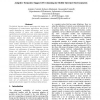Free Online Productivity Tools
i2Speak
i2Symbol
i2OCR
iTex2Img
iWeb2Print
iWeb2Shot
i2Type
iPdf2Split
iPdf2Merge
i2Bopomofo
i2Arabic
i2Style
i2Image
i2PDF
iLatex2Rtf
Sci2ools
121
click to vote
SAINT
2005
IEEE
2005
IEEE
Adaptive Semantic Support Provisioning in Mobile Internet Environments
The Mobile Internet scenario encourages the design and development of context-aware applications that provide results depending on context information, such as the relative position of users, user preferences, device capabilities and available resources. A key requirement for the provisioning of context-aware applications is to give computer systems the ability to understand context information. Semantic languages are well suited to leverage the possibility to express, process and reason about context information and to facilitate knowledge sharing and interoperability among previously unknown entities accessing services from heterogeneous devices. However, the exploitation of semantic languages for the design and deployment of context-aware applications raises new challenges, mainly due to the high degree of heterogeneity that mobile devices exhibit in terms of computing power, memory, operating system, and supported software. Semantic languages require complex and heavyweight suppor...
Context Information | Context-aware Applications | Internet Technology | SAINT 2005 | Semantic Languages |
Related Content
| Added | 25 Jun 2010 |
| Updated | 25 Jun 2010 |
| Type | Conference |
| Year | 2005 |
| Where | SAINT |
| Authors | Antonio Corradi, Rebecca Montanari, Alessandra Toninelli |
Comments (0)

